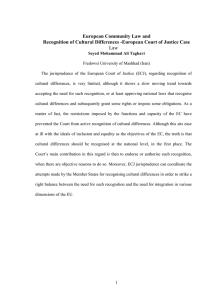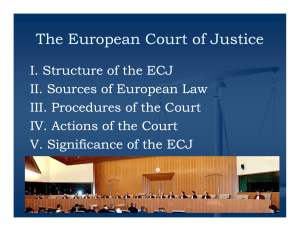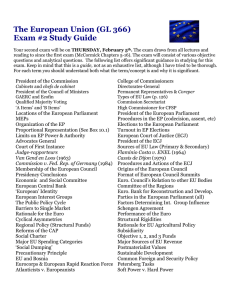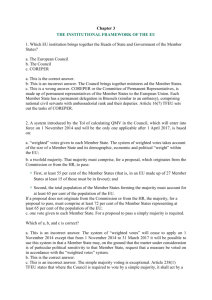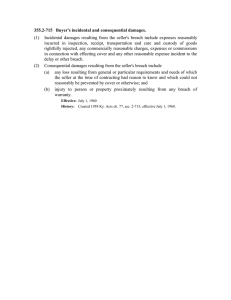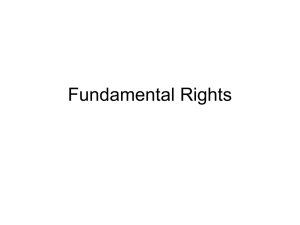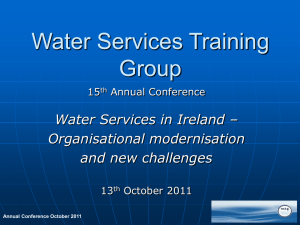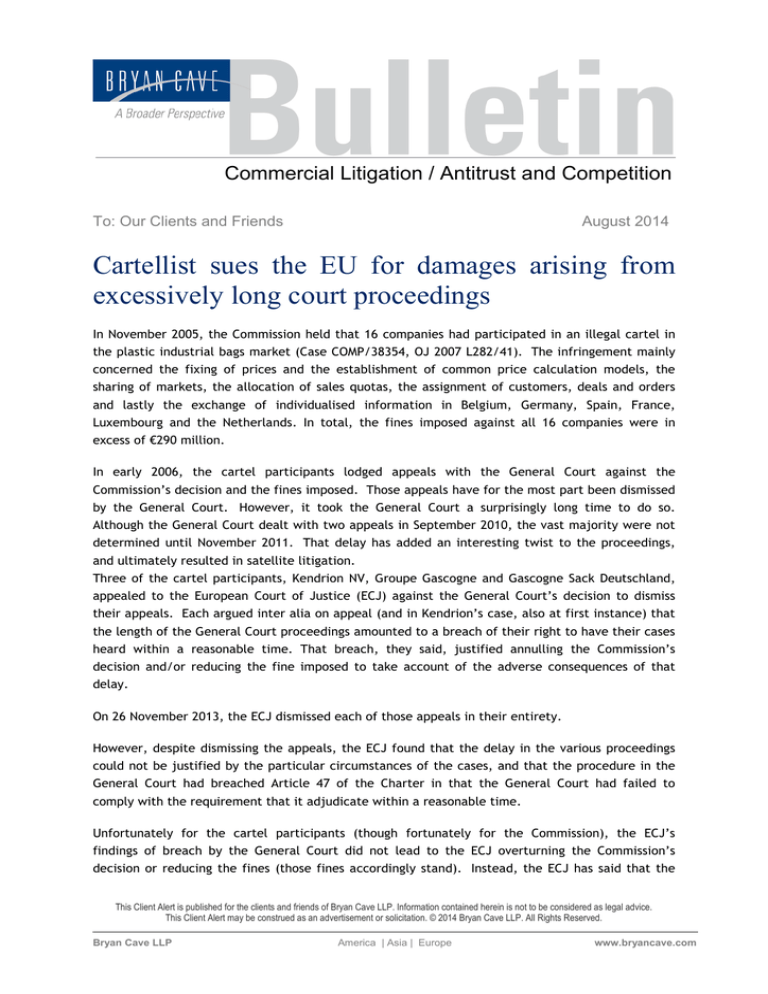
Commercial Litigation / Antitrust and Competition
To: Our Clients and Friends
August 2014
Cartellist sues the EU for damages arising from
excessively long court proceedings
In November 2005, the Commission held that 16 companies had participated in an illegal cartel in
the plastic industrial bags market (Case COMP/38354, OJ 2007 L282/41). The infringement mainly
concerned the fixing of prices and the establishment of common price calculation models, the
sharing of markets, the allocation of sales quotas, the assignment of customers, deals and orders
and lastly the exchange of individualised information in Belgium, Germany, Spain, France,
Luxembourg and the Netherlands. In total, the fines imposed against all 16 companies were in
excess of €290 million.
In early 2006, the cartel participants lodged appeals with the General Court against the
Commission’s decision and the fines imposed. Those appeals have for the most part been dismissed
by the General Court. However, it took the General Court a surprisingly long time to do so.
Although the General Court dealt with two appeals in September 2010, the vast majority were not
determined until November 2011. That delay has added an interesting twist to the proceedings,
and ultimately resulted in satellite litigation.
Three of the cartel participants, Kendrion NV, Groupe Gascogne and Gascogne Sack Deutschland,
appealed to the European Court of Justice (ECJ) against the General Court’s decision to dismiss
their appeals. Each argued inter alia on appeal (and in Kendrion’s case, also at first instance) that
the length of the General Court proceedings amounted to a breach of their right to have their cases
heard within a reasonable time. That breach, they said, justified annulling the Commission’s
decision and/or reducing the fine imposed to take account of the adverse consequences of that
delay.
On 26 November 2013, the ECJ dismissed each of those appeals in their entirety.
However, despite dismissing the appeals, the ECJ found that the delay in the various proceedings
could not be justified by the particular circumstances of the cases, and that the procedure in the
General Court had breached Article 47 of the Charter in that the General Court had failed to
comply with the requirement that it adjudicate within a reasonable time.
Unfortunately for the cartel participants (though fortunately for the Commission), the ECJ’s
findings of breach by the General Court did not lead to the ECJ overturning the Commission’s
decision or reducing the fines (those fines accordingly stand). Instead, the ECJ has said that the
This Client Alert is published for the clients and friends of Bryan Cave LLP. Information contained herein is not to be considered as legal advice.
This Client Alert may be construed as an advertisement or solicitation. © 2014 Bryan Cave LLP. All Rights Reserved.
Bryan Cave LLP
America | Asia | Europe
www.bryancave.com
breach by the General Court was a sufficiently serious breach of law that may give rise to liability
on the part of the European Union for the damages arising from it.
The ECJ said, however, that the ECJ was not the appropriate forum for determining those damages
claims, instead the disgruntled cartel participants should make an application for damages to the
General Court itself, albeit sitting in a different composition from that which heard the appeals and
whose procedure is criticised.
The ECJ also helpfully set out the principles on which the General Court should decide the claims
for damages for its breach (though as noted above, in respect of delay, it went on to make its own
findings on the facts that the General Court had not observed the reasonable time principle):
Has the General Court observed the reasonable time principle?
This is to be assessed in the light of the circumstances specific to each case, such as the complexity
of the case and the dilatory conduct of the parties (though that list is not exhaustive). In
examining those criteria, in cases concerning infringement of competition rules, the General Court
must bear in mind the “considerable importance” of the fundamental requirement for legal
certainty on which economic operators must be able to rely and the aim of ensuring that
competition is not distorted in the internal market.
Have the parties concerned actually suffered harm because their right to effective
legal protection has been breached?
The actual existence of the harm alleged and the causal connection between that harm and the
excessive length of the legal proceedings in dispute is to be assessed by examining the evidence
submitted for that purpose. When making that assessment, the General Court is to take into
consideration the general principles applicable in the legal systems of the Member States for
actions based on similar breaches. The Court is also to look at whether it is possible to identify, in
addition to any material loss, any other type of harm sustained by the party affected by the
excessive period, which should, where appropriate, be suitably compensated.
These are not the first cases in which the ECJ has confirmed that a party can bring a damages
action against the European Union for excessive delay in proceedings before the European Union
Courts. However, before now, no party has sought to actually bring such an action.
In July 2014, Kendrion became the first to do so.
In its application (subsequently printed in the Official Journal on 4 August 2014), Kendrion asserts
that the ECJ has already ruled that the conditions for a sufficiently serious breach of a rule of law
that is intended to confer rights on individuals has been met, and accordingly it is entitled to
damages of some €13.3 million, plus interest and costs of the proceedings. Kendrion’s damages are
allegedly made up of (1) “material” damage, being interest on the Commission’s fine plus costs of a
bank guarantee lodged for payment of the fine with interest; and (2) compensation for “nonmaterial” damage equating to 10% of the fine for each year (or proportion thereof) that the
proceedings exceeded a reasonable period, alternatively, fair compensation for non-material
damages amounting to 5% of the fine.
2
Bryan Cave LLP
America | Asia | Europe
www.bryancave.com
Although Kendrion is the first, in light of the ECJ’s recent decisions, is very unlikely that it will be
the last. Indeed, it would be surprising if the other cartel participants were not already preparing
to serve similar suits. Groupe Gascogne and Gascogne Sack Deutschland are the obvious contenders
given they, like Kendrion, already have the benefit of the ECJ’s finding in their particular
circumstances that the General Court failed to observe the reasonable time principle. The other
cartel participants, however, are not precluded from bringing their own actions, they would simply
have the additional hurdle of establishing that a breach of their rights had occurred – but with the
benefit of the prior ECJ decisions in very similar cases, one would not expect that hurdle to prove
prohibitively high.
For more information on this subject, kindly send your questions to the author, your contact at
Bryan Cave or to any member of the Commercial Litigation or Antitrust and Competition Client
Service Group.
Cara Dowling, London
Direct Dial: +44 (0)20 3207 1208 / cara.dowling@bryancave.com
Bryan Cave's alerts/bulletins/briefings are available online at www.bryancave.com/bulletins.
3
Bryan Cave LLP
America | Asia | Europe
www.bryancave.com

